Oklahoma could extend some tribal compacts for 1 more year. But will relations improve?
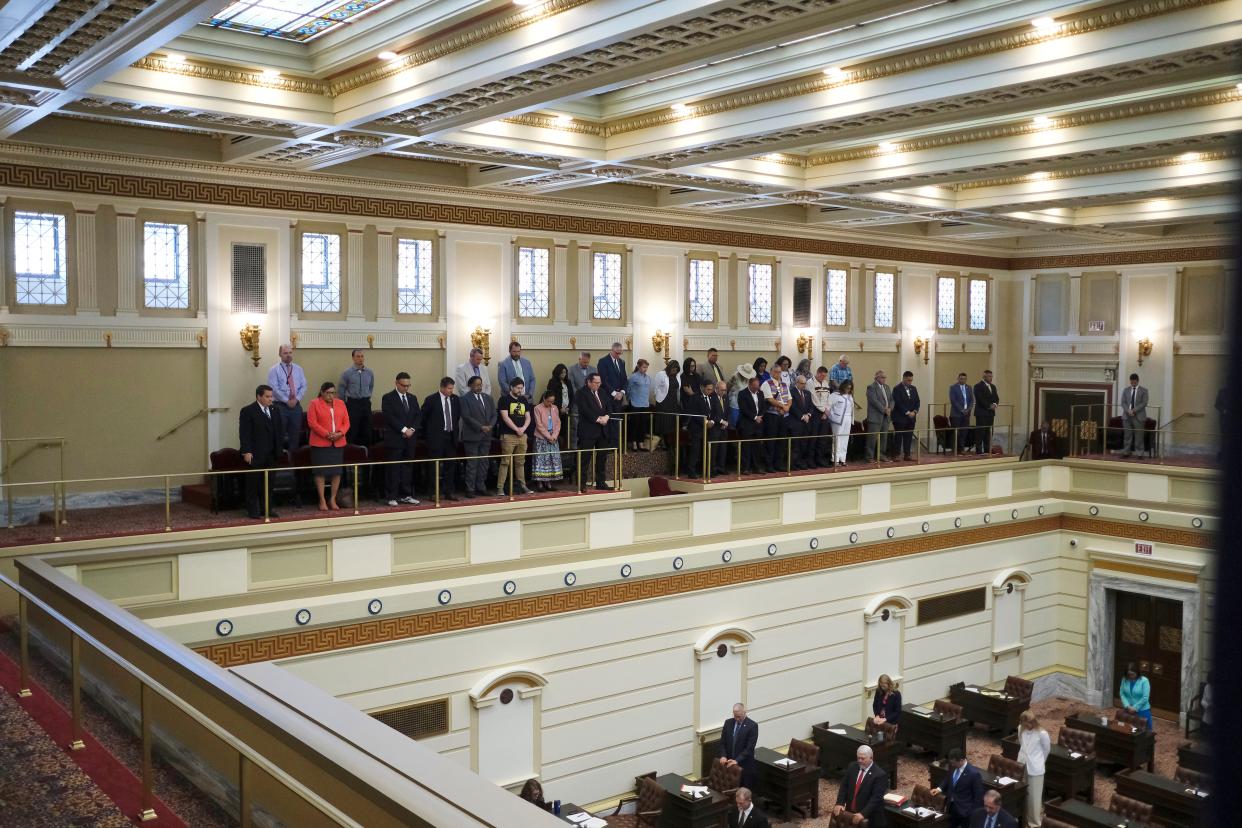
- Oops!Something went wrong.Please try again later.
The Oklahoma House of Representatives voted Monday to pass the final piece of the Legislature’s plan to renew cigarette tax agreements with tribal nations through 2024.
Top lawmakers have framed the extra time as breathing room for Gov. Kevin Stitt to negotiate with tribal leaders, but political observers and legal experts say there are no signs those working relationships will improve. The situation could even get worse.
Stitt, a Cherokee Nation citizen, is becoming more vocal about his contempt for tribal reservations that cover most of eastern Oklahoma and he launched an online campaign to advance his views. Tribal officials have countered that Stitt is again sounding false alarms about a law and order crisis that does not exist.
The governor wants to make clear the tobacco tax compacts don’t apply throughout reservations, which have all been affirmed since a 2020 Supreme Court ruling. His office said he will not amend his stance. “I will protect Oklahoma at all costs,” Stitt said.
The governor turned down the Legislature’s first attempt to extend the tax deals, as well as a trio of vehicle registration compacts. Lawmakers have met a few times throughout the summer to try to override his vetoes.
Under the agreements, Oklahoma and tribes split tax money from tobacco products sold on tribal land, an arrangement that netted the state about $50 million last year. Nearly all are set to expire in December if not renewed.
The dispute over the future of the compacts is only one issue, said Geoffrey Standing Bear, the chief of the Osage Nation. Tribal governments and the state will need to find ways to work out other pressing legal and tax concerns, he said. How that will happen is unclear.
“Override or no override,” he said, “what are we going to do in the future?”
The question is particularly vexing in Oklahoma, where one in six residents is Native American and tribal governments are among the largest employers.
More: At odds with the governor, tribal leaders are working around him
Stitt has departed from the approach of his recent predecessors, who acknowledged the economic impact of tribes and worked through disagreements to negotiate deals, said Christine Pappas, a political science professor at East Central University in Ada.
“By not playing ball with the tribes, the state of Oklahoma is leaving money and opportunity on the table,” she said. “It’s harming the people of Oklahoma by not providing these resources that we need, especially in rural Oklahoma.”
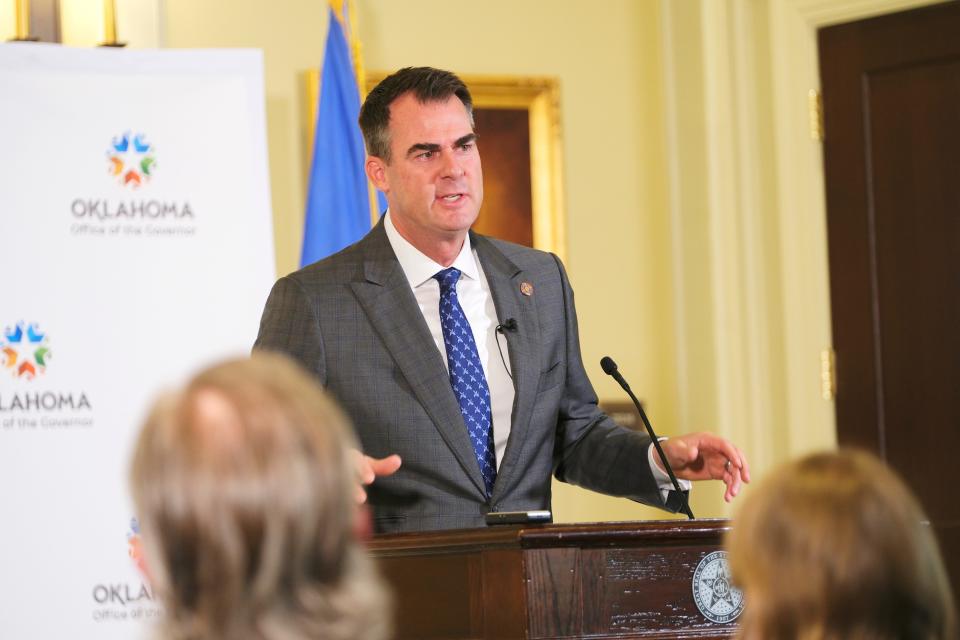
The dispute has increasingly isolated Stitt from other top Republicans, including Attorney General Genter Drummond, who is trying to remove the governor’s legal team from a lawsuit over controversial gaming compacts signed by Stitt. House Speaker Charles McCall and Senate leader Greg Treat have backed Drummond.
Treat said he plans to monitor compact talks between the governor and tribal leaders over the next several months. Lawmakers could amend the law to remove the governor’s negotiating power, Treat said on July 24, soon after the Senate voted to override Stitt’s vetoes.
“If he does not show good faith, we will have the votes to take that back,” he said.
Treat said he wants to avoid a repeat of the late 1980s and early `90s, when courts had to work through most disputes between the state and tribes.
Standing Bear, a lawyer who represented tribes during that era, agreed.
“There’s no sense in doing that when we can find a way to get something done that benefits all of our people in Oklahoma,” he said.
The biggest disagreement at the time stemmed from the advent of the tribal gaming industry. The tensions started to ease as tribes gained an economic foothold and politicians saw most voters supported gaming, said Gary Pitchlynn, a Norman attorney who represented tribal governments in the gaming talks.
The proceeds have made it possible for tribal governments to help surrounding communities pay for roads, schools and emergency services. Lawmakers who live in rural Oklahoma see those impacts and recognize the potential for economic harm if compact talks fail, said Pitchlynn, who is Choctaw.
“I think the key thing that we need to be watching right now is how long the legislature is going to allow Stitt to control that exercise,” he said, “and how long the tribes are going to tolerate it.”
Treat said he is trying to be pragmatic by leading efforts to extend the compacts for one year. “We have to coexist and thrive,” said Treat, a Republican from Oklahoma City.
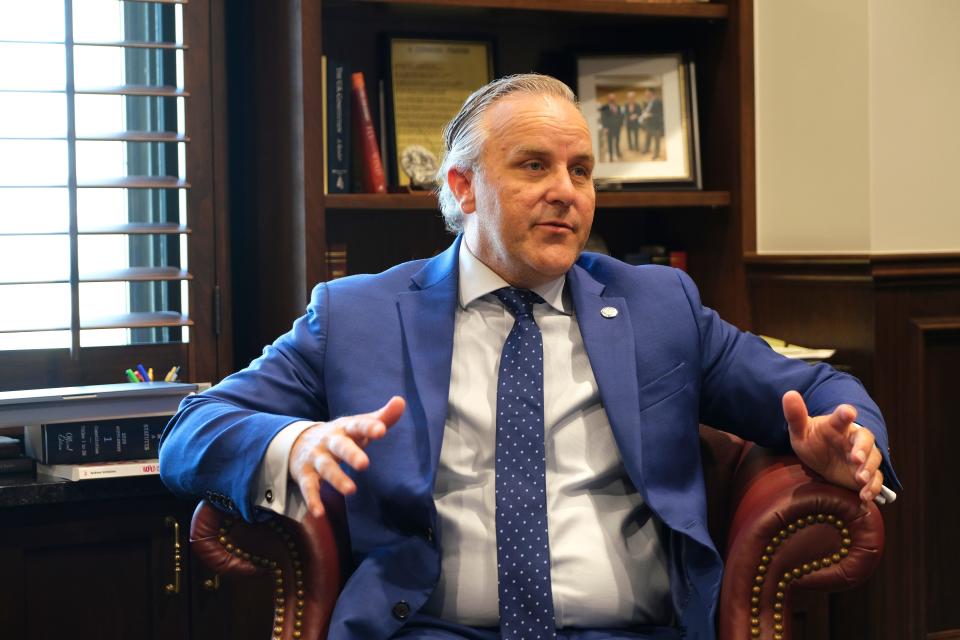
Abegail Cave, the governor’s communications director, said Treat has made it possible for tribal officials to circumvent Stitt’s authority to negotiate the deals. If the legislature votes to take that power away, Treat “can expect another veto from Governor Stitt,” Cave said in a written statement.
More: Gov. Stitt sends offer to renew tobacco tax compacts to tribal leaders. Here's what's in the offer
She said Stitt’s door is always open to meet, although “no tribal leader has taken him up on that offer,” since at least June 1. Two of his top staffers did meet with representatives from the Chickasaw Nation in July. And the governor’s office has previously said he had several meetings with tribal officials earlier this year.
Stitt debuted his “One Oklahoma” campaign July 17. The video and website criticize limits on the state’s power to prosecute Native Americans on tribal reservations. U.S. law grants tribal and federal courts that authority.
“In Oklahoma, there should be one set of rules, period. And as your governor, I’m fighting for all Oklahomans, regardless of race or heritage.” Stitt says in the video, shared on his main social media pages, where he has more than 203,000 followers.
The governor is likely using his “bully pulpit” to build a coalition, just as other political leaders have before him, said Stephen Nemeth, a professor at Oklahoma State University. He studies political violence, not state politics. He has followed Stitt’s messaging on tribal issues as an observer.
When public officials speak out about divisive topics, their words can help rally supporters and win over people who are undecided, Nemeth said.
“That’s just a time-worn strategy,” he said.
More: McGirt v. Oklahoma, 3 years later: How police work on the Muscogee Nation reservation
And the governor has found some success. Top lawmakers originally wanted to extend the compacts for five years to outlast Stitt’s time in office. But they quickly scuttled that plan and reduced the extensions to one year. They also dropped their efforts to renew gas compacts at the same time.
Still, the renewals were passed. Stitt denounced the Senate’s vote to override his vetoes as “illegitimate,” without explaining his exact reasoning. He also repeated that he trying to “protect eastern Oklahoma from turning into a reservation.”
In fact, courts have ruled at least eight tribal reservations still exist in the state. The growing recognition was prompted by the Supreme Court in its landmark McGirt v. Oklahoma ruling, which it handed down in July 2020.
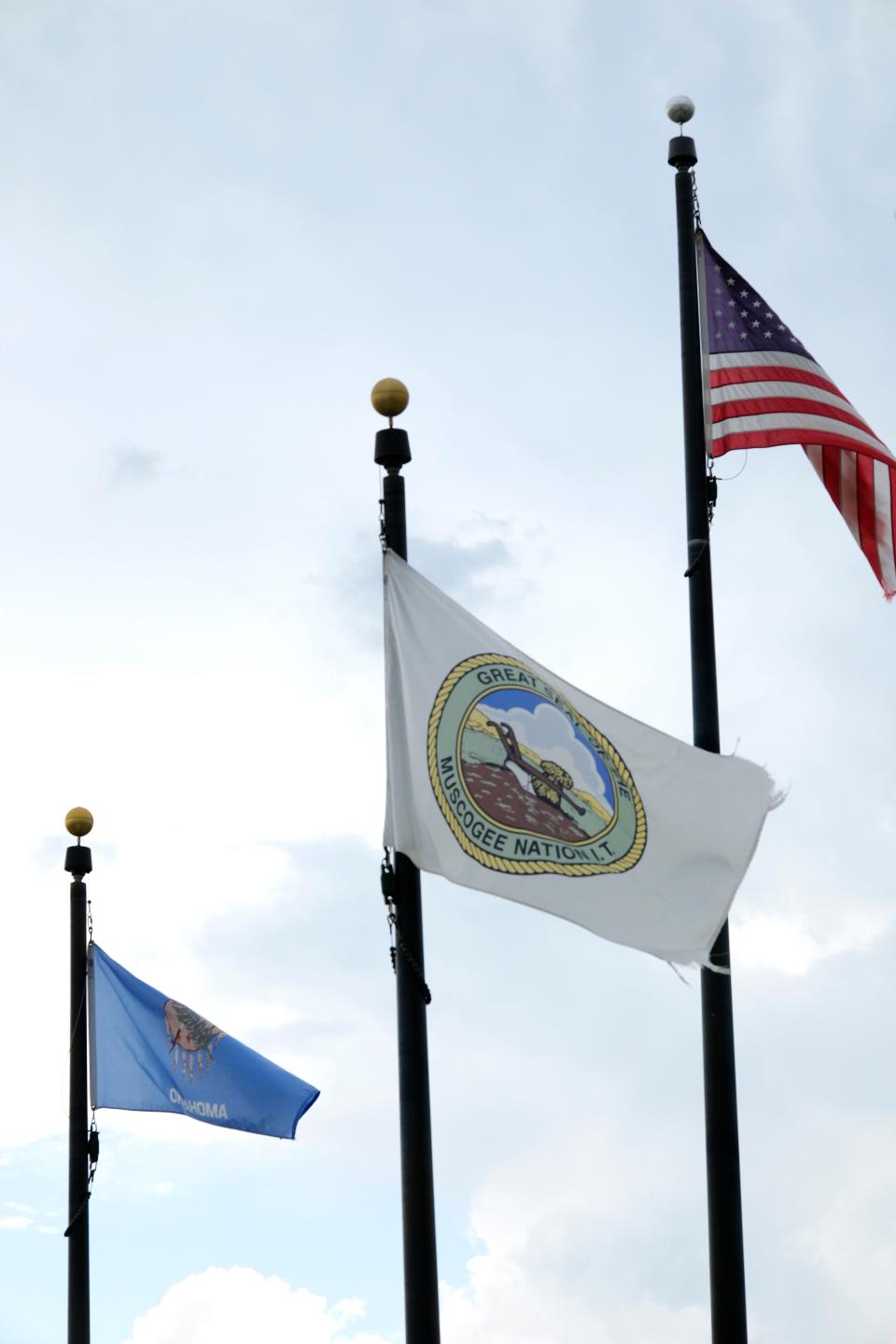
Stitt insisted for more than a year afterward that reservation land status only applied to matters of criminal jurisdiction.
But in recent months, the governor has openly worried Oklahoma could some day lose its power to tax tribal citizens who live and work within the reservations. Other state powers on reservations, such as regulating coal mining, have also been called into question. Parts of the Muscogee and Cherokee reservations encompass Tulsa, the state’s second largest city.
Pappas, the political science professor at East Central University, said she believes that through hardline messaging against tribal reservations, the governor is working to gain leverage for the state.
“I think he sees McGirt as a thin edge of the wedge that could take more control of the state from the state government,” she said.
The governor has said his goal is to prevent the state from being divided. But some people may take his rhetoric as permission to be hateful toward Native Americans and tribal nations, Pappas said. His messaging also lands amid the Republican Party’s bigger push to eliminate “wokeness,” or practices that take social and racial justice issues into account, from public schools and programs.
“The governor’s words can fan those flames and break down relationships between Oklahomans,” Pappas said, “And we have no reason to do that.”
By saying Oklahoma should run under one set of rules, the governor is ignoring federal laws like the U.S. Constitution and implying tribal governments should have no authority at all, said Crispin South, a recent University of Oklahoma graduate.
He said he was so disturbed by what he called Stitt’s “anti-tribal propaganda” that he created a website to address Stitt’s claims. Defend Native Justice (bit.ly/defend-native-justice) seeks to explain how tribal governments work in plain language, which South said he mostly wrote in an afternoon after watching the governor’s first “One Oklahoma” video.
South is a Choctaw Nation citizen who just wrapped up a summer internship with his tribe. The new website is a personal project, he said.
“Tribal nations have billions of dollars of economic impact, that if Governor Stitt keeps trying to attack it, that’s not guaranteed,” South said. “A lot of these tribal nations would not be able to make those kinds of investments without their sovereign authority.”
More: This long-running lawsuit is the latest dispute over Oklahoma tribal relations
Playing hardball with tribal governments could ultimately prompt tribal leaders to consider alternatives to working out agreements with the state, said Pitchlynn, the longtime attorney.
“The more aggressive the state becomes in trying to take things away from the tribes, the less inclined the tribes will be to share what they have with the state,” he said. “I would suspect that the tribes will be looking to put more money in communities around them and less money in the state coffers.”
If talks over tobacco tax agreements stall, tribal leaders could discuss creating their own production and distribution systems so they no longer have to pay Oklahoma anything, Pitchlynn said.
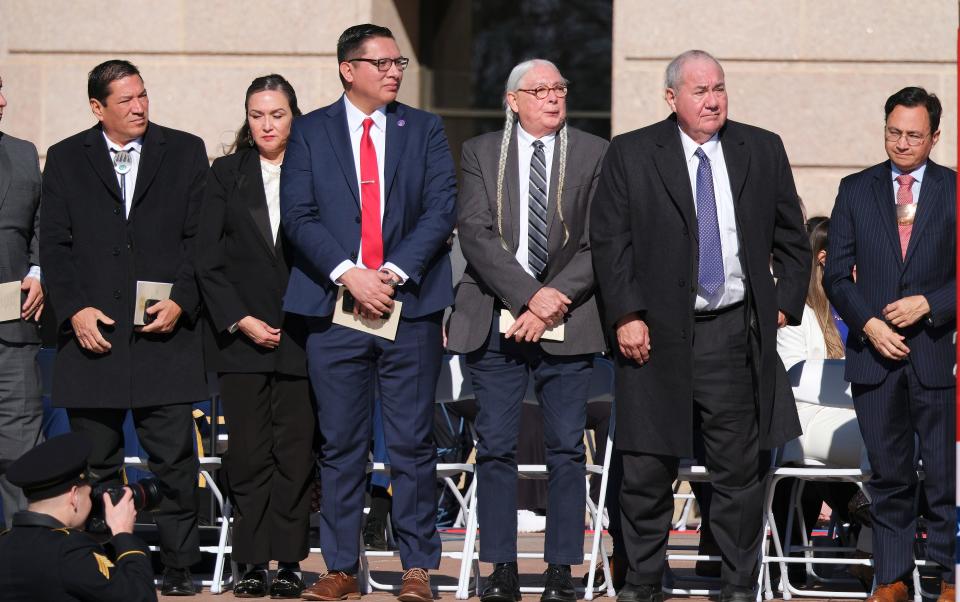
Standing Bear, the chief of the Osage Nation, said tribes could consider trading among each other, as they did in the past, to establish the industry.
The governor’s insistence that there is only one way to operate in Oklahoma is something tribal citizens have heard before, Standing Bear said. U.S. officials tried to force Indigenous people to stop speaking their languages, to stop holding their ceremonies and to stop living how they had for thousands of years.
“We’ve seen this all of our history,” Standing Bear said, then added, “Well, for 500 years.”
Read more:
Supreme Court justice grants Tulsa temporary reprieve on tribal reservation ruling
Oklahoma Senate passes tribal compact extensions, voting to override governor
Oklahoma attorney general moves to oust governor from defending his tribal gaming compacts
AG Drummond, tribal leaders say they will advance Oklahoma without the governor
Editor's note: This story has been updated to after the House vote on Monday, July 31.
Molly Young covers Indigenous affairs. Reach her at mollyyoung@gannett.com or 405-347-3534.
This article originally appeared on Oklahoman: Tensions between Oklahoma's governor, tribes loom over compact renewals

